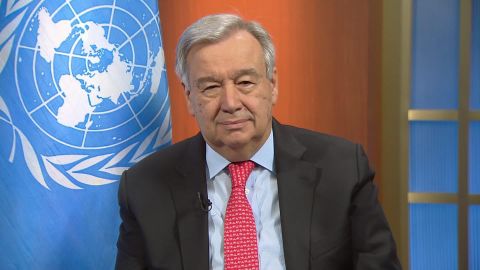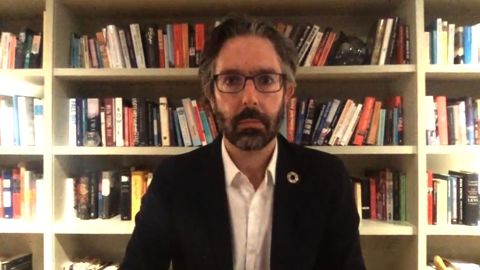Read Transcript EXPAND
CHRISTIANE AMANPOUR: Secretary-General, in your speech, in your declaration, you have said, it is time to put armed conflict on lockdown and focus together on the true fight of our lives. To the warring parties I say, pull back from hostilities, put aside mistrust and anonymity, silence the guns, stop the artillery, end the air strikes. This is crucial. Do you expect those countries to do so? Have you any hope? Have you discussed a face — not face-to-face, but in diplomatic ways with the leaders of Syria, you know, Iran, Libya, Yemen?
ANTONIO GUTERRES, UNITED NATIONS SECRETARY-GENERAL: We are already seeing in some of the scenarios the parties entering into dialogue to try to see how they can cooperate in relation to the COVID-19. My hope is that this will be more generalized. And as I said, my special envoys will now be working hard in order to make sure that these ceasefire appeal will be translated into effective diplomatic action in all areas and I hope that the G20 that will be meet soon will also be able to address this issue and I hope the Security Council that will be meeting soon will also be able to address this issue.
AMANPOUR: Just quickly before I get on to the wider aspects that you’ve just mentioned. There’s obviously great concern, not just in thesecountries with collapsing health care systems, obviously, under war, but also in the refugee camps where people are living cheek by jowl often in hugely unsanitary conditions, outside completely unprotected, whether it’s in — you know, Jordan, in Syria, in Greece or wherever it might be. How concerned are you? Because we’ve heard refugee activists and organizations very worried.
GUTERRES: Extremely concerned. This will be one of the central aspects of our humanitarian appeal that we will launch on Wednesday, $2 billion to support dramatic humanitarian consequences of the COVID-19 and the response to the COVID-19 in those dramatic situations. And of course, UNCHR, U.N., refugee agency and IOM are working to put in place a plan of action. That’s in very difficult circumstances in very dramatic conditions. We’ll do everything possible to prevent the virus to come to refugee camps and other displaced populations settlements. And at the same time, to create the minimum of conditions to effectively fight the disease in those extremely difficult circumstances. Can you imagine at Cox’s Bazar, 1 million people in a very narrow area? Can you imagine Dadaab in Kenya? Can you imagine the situation in the Syrian refugees? So, all of this is indeed an enormous concern and will be central in our appeal, humanitarian appeal and in our — the mobilization of all our response capacities in humanitarian action.
About This Episode EXPAND
Christiane Amanpour speaks with doctors, politicians, diplomats and business people about the state and effects of the coronavirus crisis.
LEARN MORE


